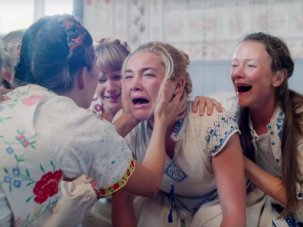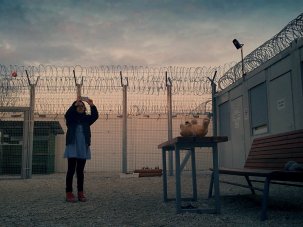
In this month’s British Cinema Special we highlight where and how the huge variety of voices that now make up the British film scene come through, and what kinds of heritage are being explored. British cinema has always been a site for passionate political and cultural debate, particularly about heritage. In recent years, however, there have been few major public rows – perhaps because of the negative media dominance of Brexit and the relentless charge of new film releases keeping commentators on the back foot. The locus of change has been more fragmented, the scene has become quieter and more decentralised. But by looking right across the range of what’s being made we think we’ve captured a key moment in the evolution of what British cinema means.
Posted to subscribers and available digitally 8 July
→ Buy a print edition
→ Access the digital edition
→
On UK newsstands 10 July
Starting, so to speak, at the top, we chart the rise and rise of Gurinder Chadha through her new film Blinded by the Light, an adaptation of Sarfraz Manzoor’s memoir of being a teenage British-Asian Springsteen fan, and her primetime TV series Beecham House, which explores the Raj from both sides at the point of its dissolution. In our in-depth interview Chadha explains her focus on identity and the need in her work to appeal across different cultures. Sarfraz Manzour also writes about his experience of being adapted.
Of equal prominence but with a more oblique aesthetic approach comes Joanna Hogg with her new film The Souvenir. This first of two linked semi-autobiographical films portrays a slow-burn romance that blossoms between a young woman film student and a mysterious older man she meets at a party. This affair is built out of awkward intimacies, a shared taste for opulent refinement and a hint of mad love taking place in a placid domestic milieu, and the film tackles issues of Britishness and class head on. Nick James visits the film’s set, reflects on Hogg’s career so far, and interviews Hogg as she’s shooting Part Two.
Whose heritage does British cinema now represent? Asking the question means looking, as Will Massa does in his essay No Place Like Home, at the people of colour born in Britain who’ve made existing films in their parents’ country of origin, such as Rungano Myoni’s I Am Not a Witch, Sarmad Masud’s My Pure Land, Babak Anvari’s Under the Shadow and Naji Abu Nowar’s Theeb. But it also means new films like Mark Jenkin’s spiky tourism impact assessment Bait, William McGregor’s folk horror Gwen, Shola Amoo’s forthcoming The Last Tree and Harry Wootliff’s anti-romantic couple drama Only You, all of which we profile.
Rounding off our special is an interview with BFI Film Fund head Ben Roberts in which he outlines the strategic priorities for British film’s future.
→ Buy a print edition
→ Access the digital edition
→
Features
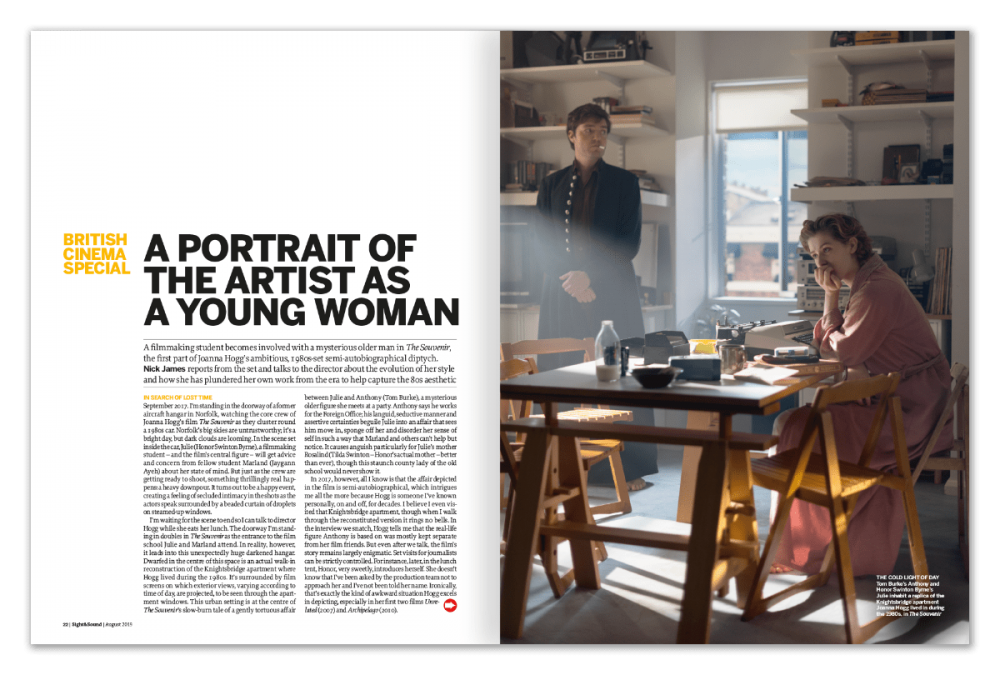
A Portrait of the Artist as a Young Woman
A filmmaking student becomes involved with a mysterious older man in The Souvenir, the first part of Joanna Hogg’s ambitious, 1980s-set semi-autobiographical diptych. Nick James reports from the set and talks to the director about the evolution of her style and how she has plundered her own work from the era to help capture the 80s aesthetic.

No Place Like Home
A new generation of talented British filmmakers looking to explore their heritage are injecting a fresh dynamism into UK cinema, presenting a diverse array of expansive international tales that are helping to redefine the very nature of Britishness on the global stage. By Will Massa.
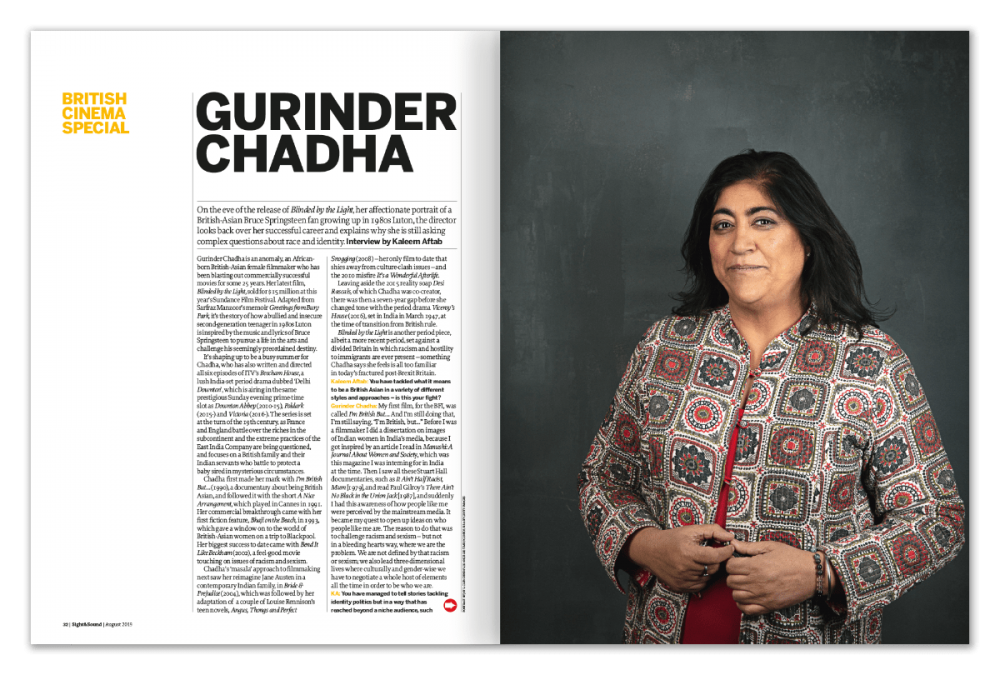
Gurinder Chadha
On the eve of the release of Blinded by the Light, her affectionate portrait of a British-Asian Bruce Springsteen fan growing up in 1980s Luton, the director looks back over her successful career and explains why she is still asking complex questions about race and identity. Interview by Kaleem Aftab.
+ The boss of it all
Sarfraz Manzoor reflects on the challenge of adapting his memoir for Gurinder Chadha, and learning that truth is more important than facts.
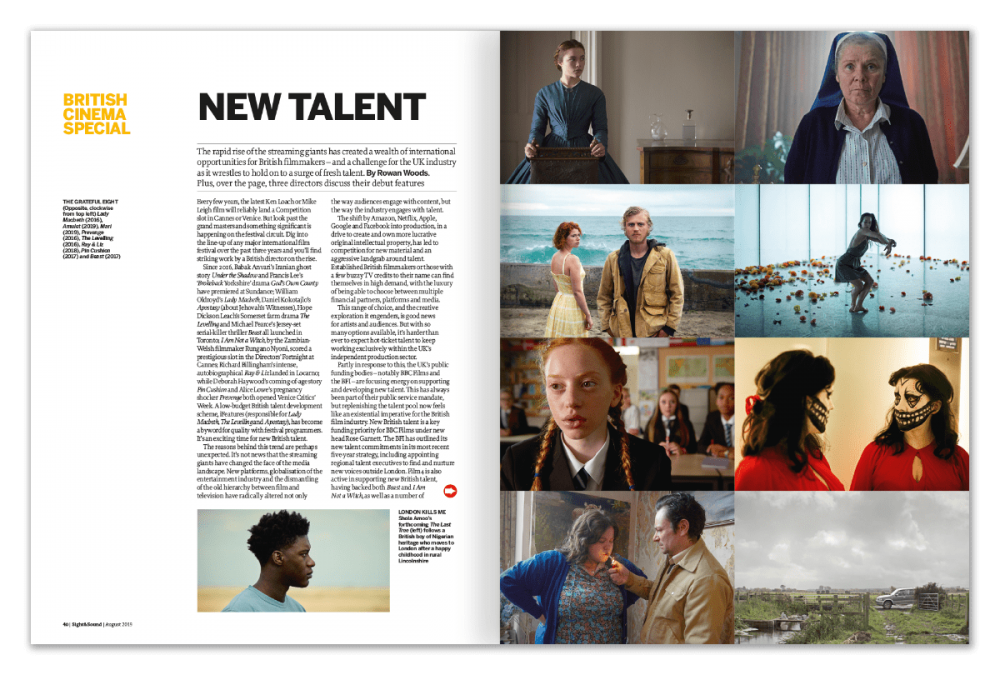
New talent
The rapid rise of the streaming giants has created a wealth of international opportunities for British filmmakers – and a challenge for the UK industry as it wrestles to hold on to a surge of fresh talent. By Rowan Woods.
+ New directors: Harry Wootliff
Only You is a touchingly naturalistic, anti-romantic drama about a young couple who meet, fall in love, and then struggle to have a baby. By Beth Webb.
+ New directors: William McGregor
Folk horror and industrial history combine in Gwen, a stark rural period piece set in the mountainous landscapes of north Wales. By Isabel Stevens.
+ New directors: Mark Jenkin
Mark Jenkin’s Bait, exploring the impact of tourists on a Cornish fishing village, offers a hypnotically beautiful evocation of early cinematic masters. By Philip Concannon.
+ Swimming upstream
Though he is clear-eyed about the challenges ahead, BFI Film Fund head Ben Roberts remains upbeat, arguing that personal stories and subversive sentiments are key to driving audiences. By Nick James.
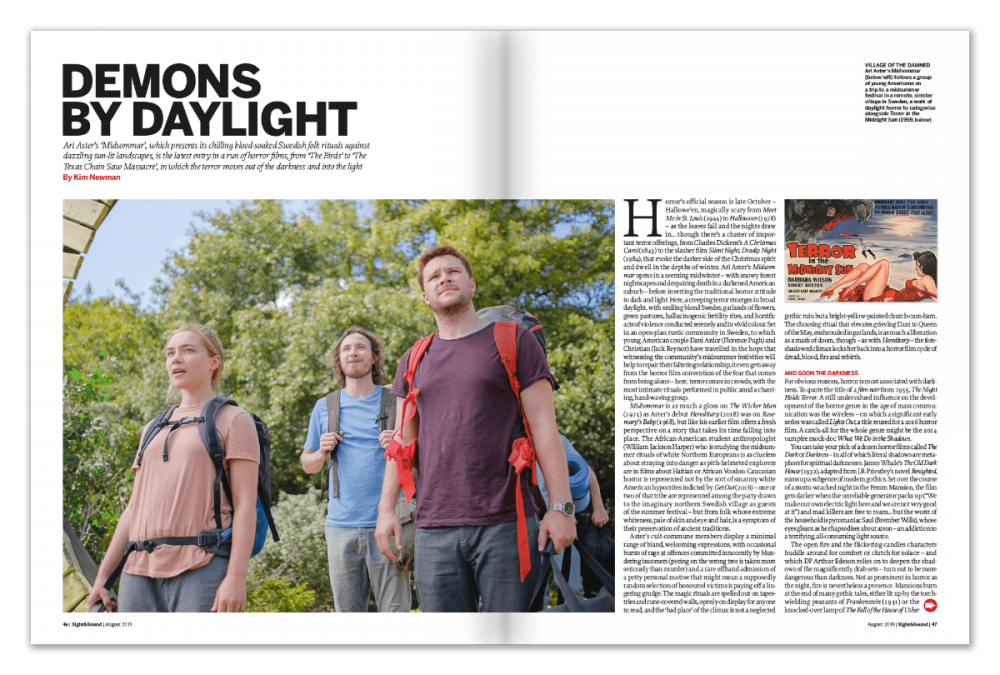
Demons by Daylight
Ari Aster’s Midsommar, which presents its chilling blood-soaked Swedish folk rituals against dazzling sun-lit landscapes, is the latest entry in a run of horror films, from The Birds to The Texas Chain Saw Massacre, in which the terror moves out of the darkness and into the light. By Kim Newman.
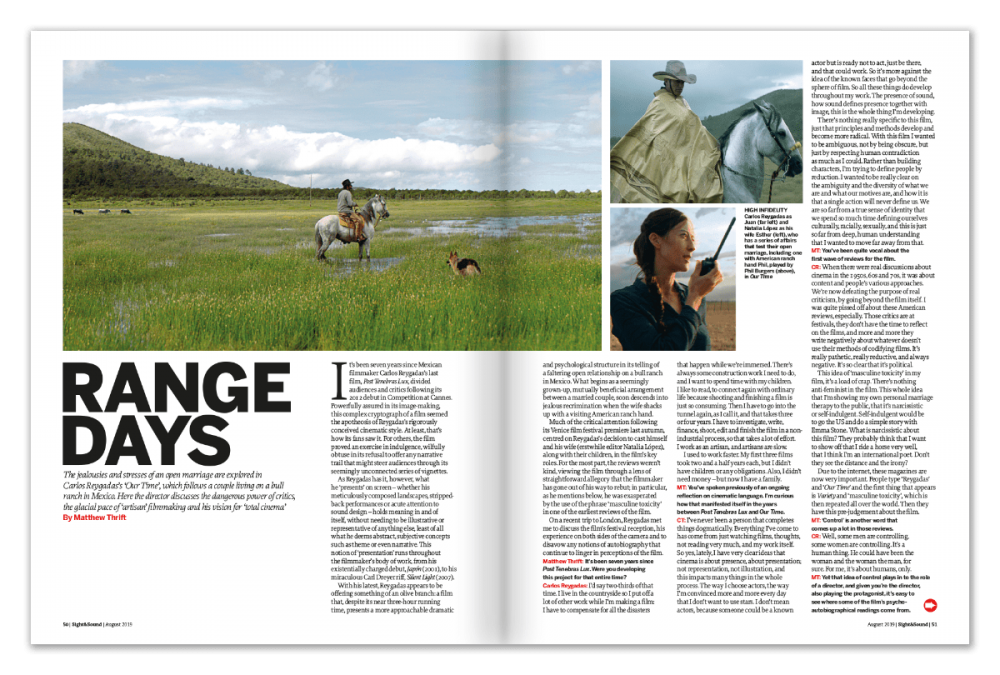
Range Days
The jealousies and stresses of an open marriage are explored in Carlos Reygadas’s Our Time, which follows a couple living on a bull ranch in Mexico. Here the director discusses the dangerous power of critics, the glacial pace of ‘artisan’ filmmaking and his vision for ‘total cinema’. By Matthew Thrift.
Regulars
Editorial
Adaptation
Rushes
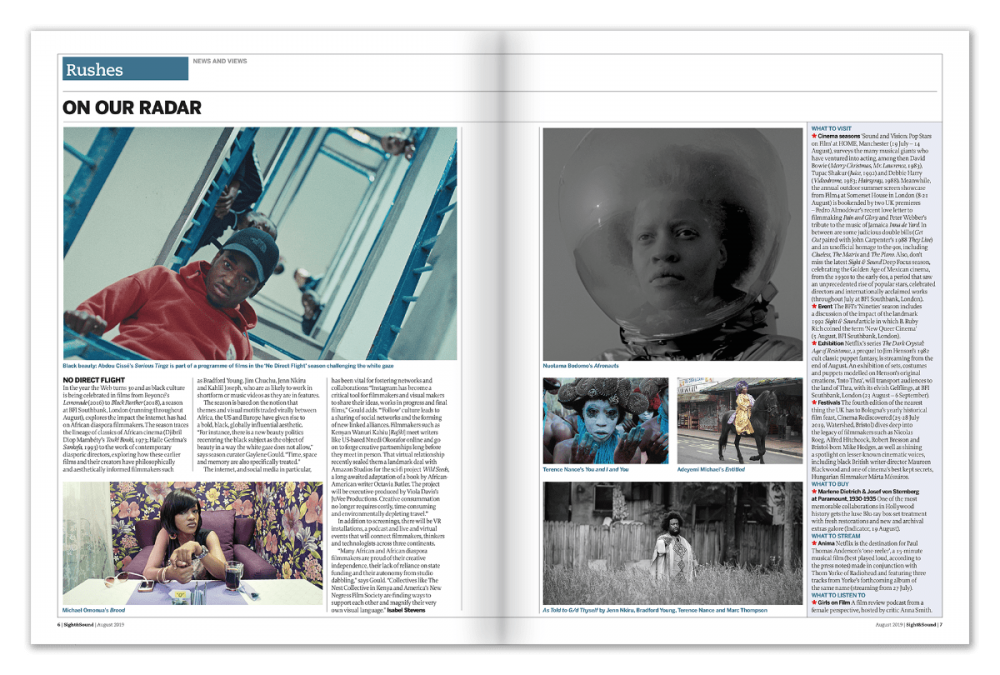
Our Rushes section
On our radar
No Direct Flight, a season dedicated to African diaspora filmmakers at BFI Southbank, plus what to visit, buy, read and stream.
All about Eve
Lila Avilés’s The Chambermaid offers a dryly comic commentary on class and race, in a portrait of working life in a luxury hotel in Mexico City. By Jonathan Romney.
Dream palaces: UGC Danton, Paris
Flâneuse author Lauren Elkin describes the rich pleasures of cinema-going as an outsider in Paris and how it helps rejuvenate her passion for the city.
The numbers: British films
British breakouts at the box office have proved hard to come by in recent months, making audience engagement all the more critical. By Charles Gant.
Films in production
New projects for Lenny Abrahamson, Barry Jenkins, David Chase and Mike Hodges.
Festivals
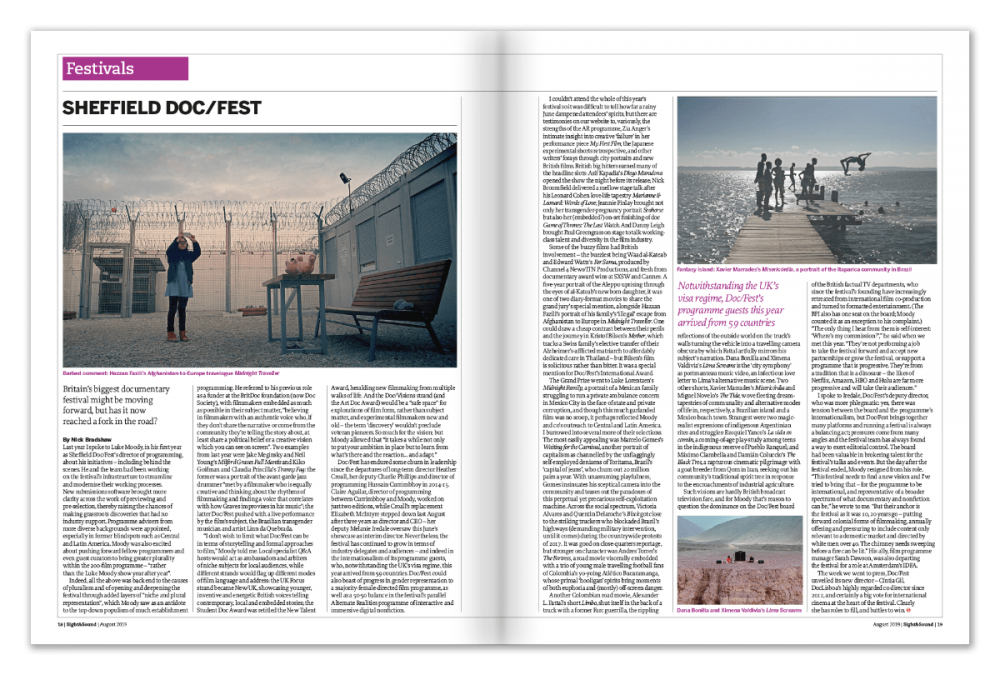
Sheffield Doc/Fest
Wide angle
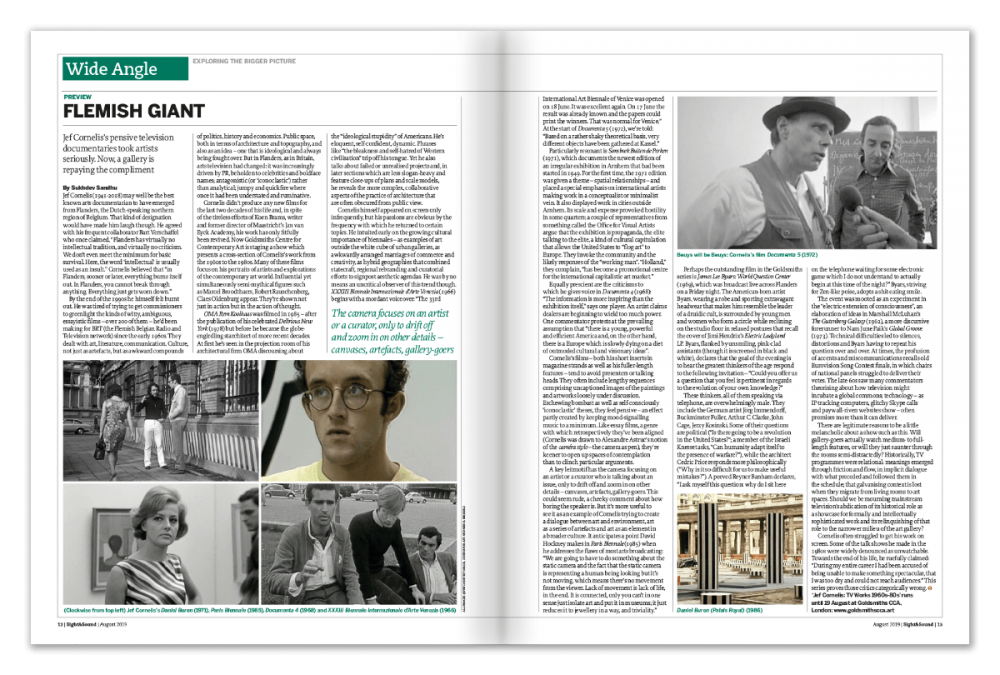
Our Wide Angle section
Flemish giant
Jef Cornelis’s pensive television documentaries took artists seriously. Now, a gallery is repaying the compliment. By Sukhdev Sandhu.
Darkest hour
The first film of a solar eclipse has just come to light, and its backstory shows how early cinema mixed science, entertainment and magic. By Bryony Dixon.
New wave heroes
Returning again to his 1967 landmark film Wavelengths, Michael Snow shows time and space still have mysteries to offer. By Ben Nicholson.
Reviews

Our Reviews section
Films of the month
Rolling Thunder Revue
Varda by Agnès
plus reviews of
Animals
Are You Proud?
Article 15
Blue My Mind
The Brink
Campo
The Chambermaid
Child’s Play
The Cold Blue
The Current War
Dark Phoenix
The Dead Don’t Die
Die Tomorrow
Godzilla: King of the Monsters
Gwen
Horrible Histories: The Movie – Rotten Romans
The Intruder
Kursk: The Last Mission
Late Night
Ma
Making Noise Quietly
Marianne & Leonard: Words of Love
Men in Black: International
My Friend the Polish Girl
Only You
Ordinary Time
Our Time
Pavarotti
Penny Slinger: Out of the Shadows
Photograph
Robert the Bruce
Tell It to the Bees
Toy Story 4
Home cinema features
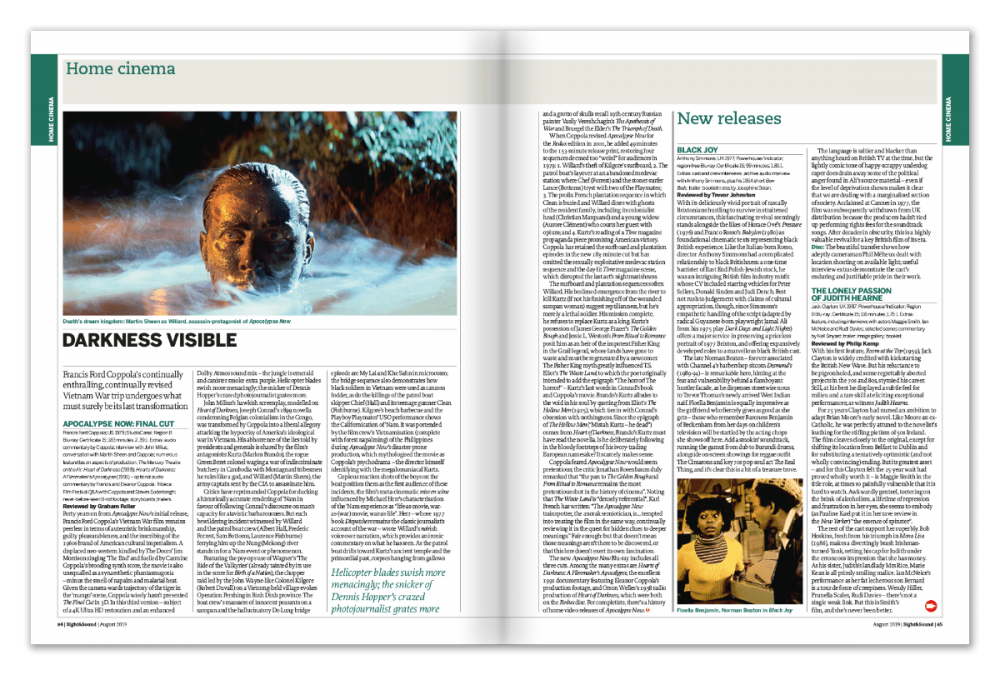
Our Home Cinema section
Darkness visible: Apocalypse Now: Final Cut
Francis Ford Coppola’s continually enthralling, continually revised Vietnam War trip undergoes what must surely be its last transformation. By Graham Fuller.
Anthology: Dave McKean: Short Films
A new book and disc package highlights the fragmentary brilliance, across media, of the artist Dave McKean. Reviewed by Tony Rayns.
Move over, Stalin: Khrustalyov, My Car!
Slated on release, Alexei German’s picture of the USSR at the end of Stalinism has the rigorous logic of insanity, or of an alien planet. Reviewed by Jonathan Romney.
Lost and found: The Blockhouse
Peter Sellers’s career was sprinkled with flops – but this uncompromisingly bleak, plotless war film is rather more than that. By John Bleasdale.
plus reviews of
Black Joy
The Lonely Passion of Judith Hearne
The Man Who Laughs
People on Sunday
Scum
Swing Time
Who?
The Woman in the Window
Television
Robert Hanks on The Love School and David Nixon’s Magic Box
Books
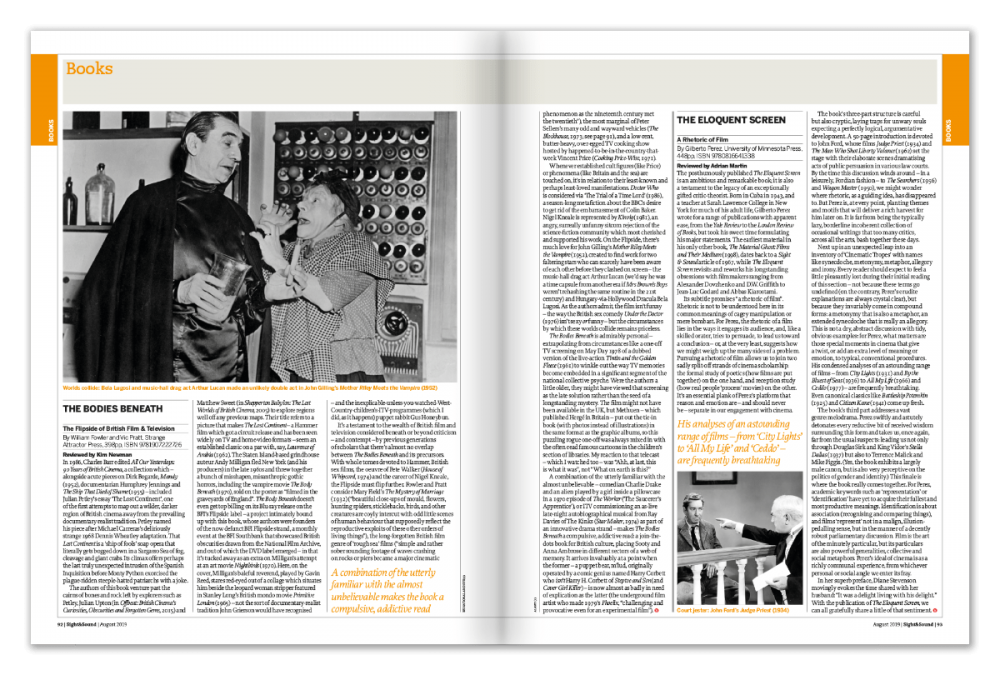
Our Books section
The Bodies Beneath: The Flipside of British Film and Television by William Fowler and Vic Pratt (Strange Attractor Press) reviewed by Kim Newman
The Eloquent Screen: a Rhetoric of Film by Gilberto Perez (University of Minnesota Press) reviewed by Adrian Martin
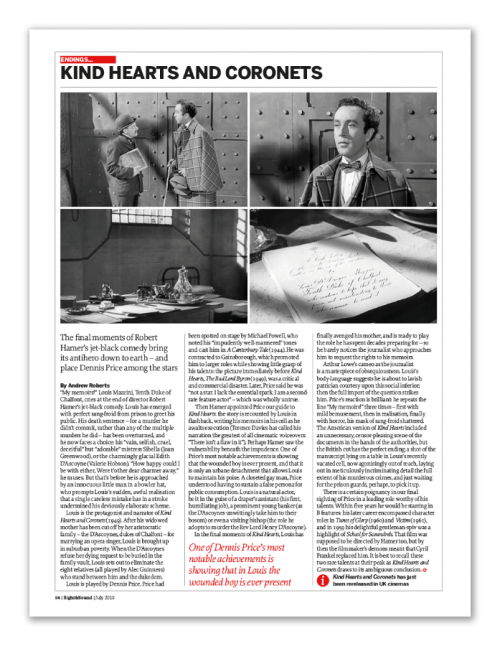
Our Endings section
Letters
Endings
The Green Ray
The seemingly miraculous green flash that closes Eric Rohmer’s film offers its romantic protagonist a great moment of epiphany. By Geoff Andrew.
Further reading
-
The Digital Edition and Archive quick link
Log in here to your digital edition and archive subscription, take a look at the packages on offer and buy a subscription.




